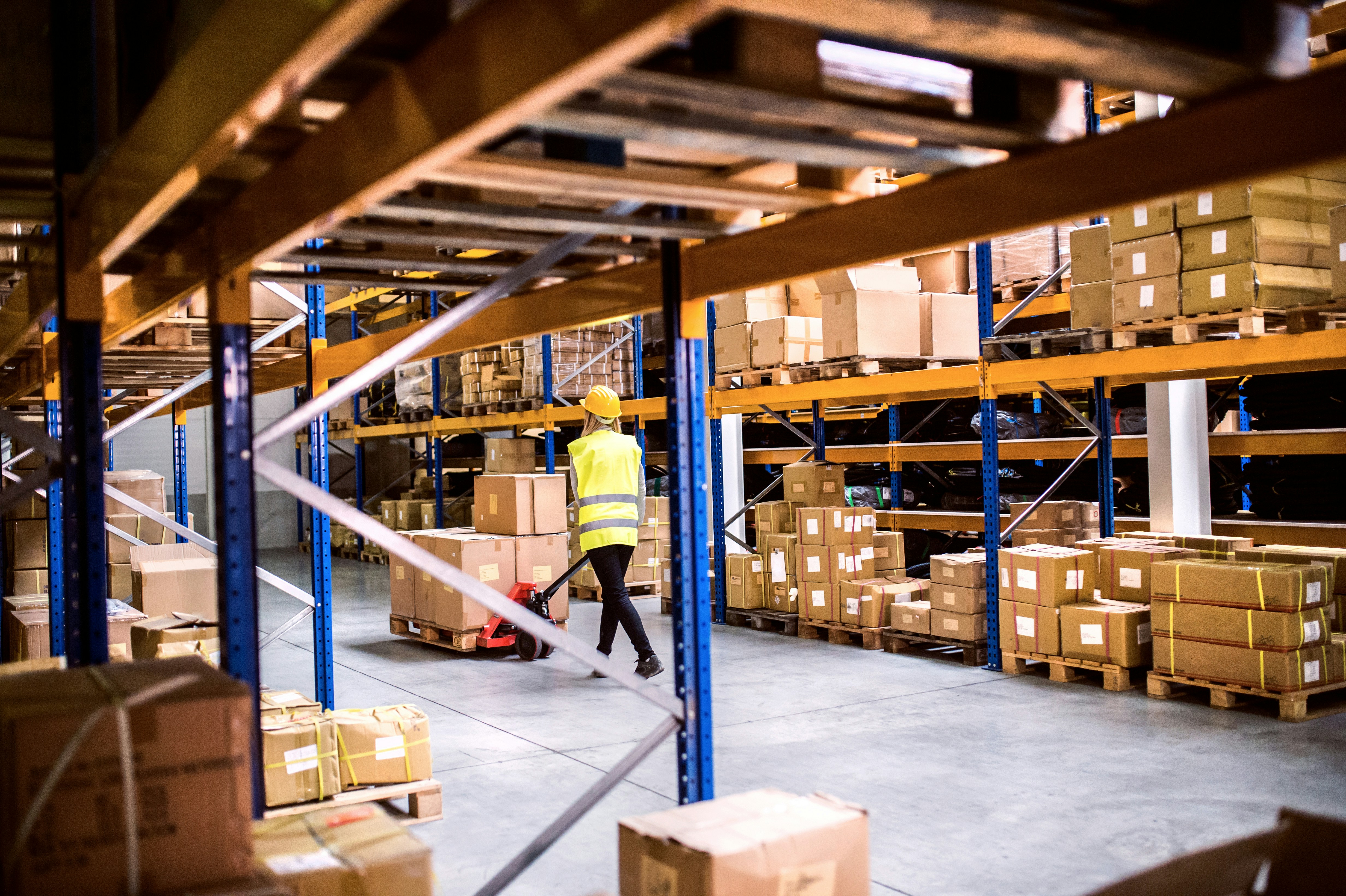Key takeaways
E commerce warehouse: Do you need one to run an ecommerce business?
Running an ecommerce business today means juggling customer expectations, inventory management, fast shipping, and operational efficiency—all while trying to stay profitable.
At the heart of it all lies the physical space where you run your business from.
But does that space have to be a warehouse? The answer can vary significantly, depending on your growth stage, order volume, support needs, and more. It's also important to take into account growth potential, cost, and prerequisites before deciding on a warehouse. For example, businesses in the pre-launch stage definitely don’t need a warehouse space. But someone who just went viral on social media might in order to ship orders out quickly and efficiently.
This post unpacks how to decide if you need a warehouse to run an ecommerce business. We’ll touch on the various kind of warehouse spaces available (i.e., 3PLs, co-warehousing) and even some more affordable alternatives if you decide you don’t want a lease (you read that right). Certain warehouse solutions are commonly used by ecommerce businesses at different stages of growth.
When growing ecommerce businesses do need warehouse space

It’s true that many new ecommerce sellers start out running their business from home or a small storage unit. While that’s a great starting point, here are some signs it might be time to upgrade to an ecommerce warehousing solution:
- Your order fulfillment times are dragging.
- You need adequate space to organize and scale operations.
- You’re managing multiple warehouses or scattered inventory.
- The increasing number of SKUs or orders is making it difficult to manage inventory efficiently.
- You’re exploring new ecommerce platforms or markets due to business growth.
- Managing inventory from your home or a storage unit is becoming unbearable.
- Your customer experience is beginning to diminish.
Owning or leasing a warehouse can give you more space to grow and run your business.
Ecommerce warehousing: More than just a storage space
Modern ecommerce warehousing operations are smart, agile, and tech-integrated. With the right warehousing services, you can:
- Track inventory in real time
- Optimize order picking and packing
- Integrate with your ecommerce store
- Enhance efficiency and quality control
- Drive increased customer satisfaction
- Optimize your supply chain operations
- Improve your profit margins
- Access multiple fulfillment centers
Unlike a traditional warehouse, a fulfillment center is designed for rapid order processing, including efficient picking, packing, shipping, and handling returns, making it ideal for online businesses.
This setup turns your warehouse into a strategic advantage—not just “a place for boxes.”
Benefits of private warehouses

Owning or leasing a warehouse can give you more space to grow and run your business. An owned warehouse provides even greater control over operations, allowing for full customization to meet your specific needs and potentially reducing long-term costs compared to leasing or using third-party facilities.
1. Total control over your fulfillment service
No more chasing carriers or guessing where a package went. When you own a warehouse, you manage the shipping carriers, packaging, and warehouse guidelines on your terms.
2. Smart inventory management
A warehouse management system (WMS) helps reduce stockouts, track inventory in real time, calculate the exact number of SKUs in stock, and manage restocks intelligently. These smart warehouses improve your supply chain by optimizing SKU placement for efficient picking and keep customers happy. Managing a large number of SKUs is essential for fast and accurate order fulfillment.
3. Faster ecommerce operations
When you control every step of order fulfillment, you can guarantee orders are shipped quickly and accurately, ensuring faster delivery. That’s not just a logistical win—it’s a customer satisfaction booster.
4. Cost-effective at scale
If you're moving large volumes, buying or leasing a distribution center may lower your per-order cost over time by slashing third-party fees and reducing shipping costs.
But here's the flip side…
1. High upfront costs
Leasing or buying a warehouse means putting serious capital into storage space, equipment, tech, and staffing, especially when building a warehouse from the ground up. For new ecommerce businesses, that can strain your budget.
2. Operational complexity
Running your own warehouse means overseeing the activity at shipping and receiving docks, as well as staffing, equipment maintenance, climate control, and safety measures. That’s a lot of plates to keep spinning.
3. Less flexibility
Traditional ecommerce warehousing models aren't built to flex with seasonal volume. If you overestimate your space needs, you're stuck paying for square footage you don't use.
Alternative ecommerce warehousing options for every stage of growth
Not ready to go full warehouse-owner? Here are your options:
There are several kinds of warehousing solutions available for ecommerce businesses, including third-party logistics providers, shared warehouses, and on-demand storage.
Third-party logistics (3PL) providers

A 3PL handles storing inventory, picking, packing, and shipping. Some 3PLs also offer direct shipping to consumers, streamlining the fulfillment process through direct-to-consumer (DTC) distribution channels. It’s plug-and-play for many enterprise-level online sellers looking for staffed fulfillment centers.
But the downside is less control over brand experience, lack of visibility into the fulfillment process, and hidden fees.
Public warehouses
These “pay-as-you-go” facilities offer scalable solutions without the commitment, allowing businesses to store inventory flexibly as their needs change. Public warehouses are great for fluctuating stock but may lack customization or personalized support.
Cooperative warehouses
Cooperative warehouses let businesses share costs, space, and resources—perfect for scaling without biting off more than you can chew.
Co-warehousing

Here’s where Saltbox comes in. Our smart warehouses blend physical space, logistics services, and business support to give your ecommerce business ultimate flexibility. Co-warehousing solutions are specifically designed to optimize the movement of goods and resources within the facility, reducing inefficiencies and streamlining workflow. You get:
- Fully equipped warehouse suites
- Access to scalable solutions like pick-and-pack
- On-site support and package drop-offs
- Local carrier discounts through our shipping app partner, Parsel
Saltbox Access Plans

If you’re an emerging and growing product-based business that isn’t quite ready for a warehouse space, but needs access to logistics support, Saltbox Access Plans are a flexible alternative. Access Plans are ideal for businesses operating an online store and needing flexible logistics support to manage orders efficiently. Access Plans provide:
- Accessibility: Choose from three membership tiers—Virtual, Starter, and Scale. There’s a plan for every entrepreneur, no matter where you are in your growth journey.
- Flexibility: Scale up or down without the long-term lease lock-in.
- Credibility & community: Get a professional business address (no more having to publicly list your home address!) and access to our FREE digital community, Upstream Entrepreneurs Club.
- Growth enablement: Everything you need to build a successful business, from logistics infrastructure to support to connections.
…all without having to commit to a warehouse lease.
Access Plans are perfect for ecommerce sellers testing the waters, handling seasonal overflow, or looking for a professional upgrade from running their business from home. The best part? Access Plans come with a 30-day money-back gaurantee. No commitment = the freedom to choose what works best for you.
Choosing the right ecommerce warehousing solution
Let’s break it down:
- Still scaling? Consider public or cooperative warehouses
- Want control but not complexity? Go with a co-warehousing solution like Saltbox
- Looking for low-commitment support and community? Saltbox Access Plans are the perfect choice
- Have the capital and high volume? A private option is your best bet
- Just need someone else to do it all and don’t mind sacrificing your brand image? a 3PL might be right for you
It’s important to really evaluate your business needs, order volume, product type, and plans for future growth to make an informed decision, ensuring all relevant factors are considered before choosing a solution.
Other considerations when searching for an ecommerce warehouse
Technology integrations
Technology integration is crucial for any ecommerce business looking to improve efficiency and stay competitive. Modern inventory management systems allow you to track products in real time, eliminating errors and ensuring you always know what’s in stock. For example, integrating barcoding and labeling systems into your workflows streamlines everyday operations, from receiving shipments to picking and packing orders, reducing manual data entry and the risk of mistakes.
A robust warehouse management system (WMS) provides support for every stage of your warehouse operations, including inventory management, shipping, and returns. By choosing the right systems, you can scale your business effectively, automate routine tasks, and provide a seamless experience for your customers. Technology integration isn’t just about keeping up—it’s about setting your business up for long-term success by making your operations more accurate, efficient, and responsive.
Shipping, receiving, and returns management
Shipping, receiving, and returns management are at the heart of efficient warehouse operations. Setting up a robust system requires careful planning to ensure you have adequate space for pallets and boxes, as well as the right handling equipment to move products with minimal effort. Well-designed workflows help your team process incoming shipments quickly, organize inventory efficiently, and prepare orders for shipping without unnecessary delays.
Returns processing is another crucial factor in ecommerce management. A systematic approach to handling returns—inspecting products, updating inventory, and restocking—helps reduce errors and keeps your customers satisfied. By providing strong support for these activities, you can minimize delayed shipments, increase productivity, and maintain a high standard of service. Ultimately, effective shipping, receiving, and returns management are essential for keeping your warehouse operations running smoothly and your customers happy.
Warehouse safety, security, and compliance
Ensuring warehouse safety, security, and compliance is essential for the success of your ecommerce operation. Setting up a secure facility with modern systems—such as CCTV cameras, alarms, and access controls—protects your products, workers, and equipment from theft and unauthorized access. Safety measures are crucial not only for legal compliance but also for the well-being of your team and the smooth running of everyday operations.
Compliance with industry regulations, especially for sensitive products like food, is a key part of maintaining your reputation and avoiding costly legal issues. By prioritizing safety and security, you create a facility where your team can work confidently and efficiently, and your products remain protected at every stage. Investing in these systems is a smart move that supports your business’s long-term success.
Sustainability in ecommerce warehouse operations
Sustainability is becoming a top priority in modern ecommerce warehouse operations. Choosing eco-friendly practices not only supports the environment but can also improve your brand’s reputation and attract customers who value green initiatives. For example, optimizing warehouse space and using energy-efficient lighting and equipment can significantly reduce your operation’s energy consumption.
Public warehouses and fulfillment centers often provide flexible and customized solutions that support sustainable practices, such as recycling programs and reduced packaging materials. By integrating these options into your warehouse operations, you can minimize waste and lower your carbon footprint. Embracing sustainability isn’t just good for the planet—it’s a smart business move that can set your ecommerce operation apart in a crowded market.
Managing ecommerce warehousing

Once you find the right ecommerce warehousing solution, implementing best practices is essential for maintaining accuracy, speed, and customer satisfaction. By focusing on these strategies, businesses can achieve efficient operations, optimizing warehouse layout and process flows to boost productivity and reduce unnecessary handling.
1. Use a Warehouse Management System (WMS)
Real-time inventory insights = no more surprises. Automate restocks and fulfill faster.
2. Optimize your warehouse layout
Design matters. Label shelves, streamline your zones, and minimize empty air around stored items to maximize storage density, cutting down time spent picking and packing.
3. Train your team
Your fulfillment team is your frontline. Regular training = fewer errors, smoother ops, and happier customers.
4. Monitor your operational costs
From shipping carriers to climate control, know where your money is going—and look for ways to optimize operations.
Your ecommerce warehouse, your way
So...do you need a warehouse to run your online business? Not always.
But as your orders pick up, your ecommerce warehousing setup needs to scale with you.
Whether that's leasing a space, joining a co-warehousing community, tapping into a low-risk Saltbox Access Plan, or going full 3PL—we're here to help guide you to the best option for your business model, your brand, and your customers.
Find your flexible warehouse space
Book a tour and see how Saltbox can help you scale your online business without the logistical headaches—experience the benefits directly.
Frequently asked questions
For Her
For Him
For Pets
For Anyone

Related posts
Learn from businesses improving their operational efficiency. Explore how Saltbox’s expert support and flexible spaces drive their growth.


10 best ReadySpaces alternatives and competitors In 2026
I’ll review the top 10 ReadySpaces alternatives for efficiently managing inventory with dedicated spaces.


Amazon stopped doing FBA prep: What sellers need to do in 2026
Amazon’s exit from in-house prep means sellers must now rely on third-party FBA prep services to stay compliant, avoid delays, and protect their bottom line.


10 best Cubework alternatives and competitors in 2026
We’ll evaluate the 10 best Cubework alternatives that can help you stay on top of your inventory with dedicated workspaces.
Related terms
Learn from businesses improving their operational efficiency. Explore how Saltbox’s expert support and flexible spaces drive their growth.







